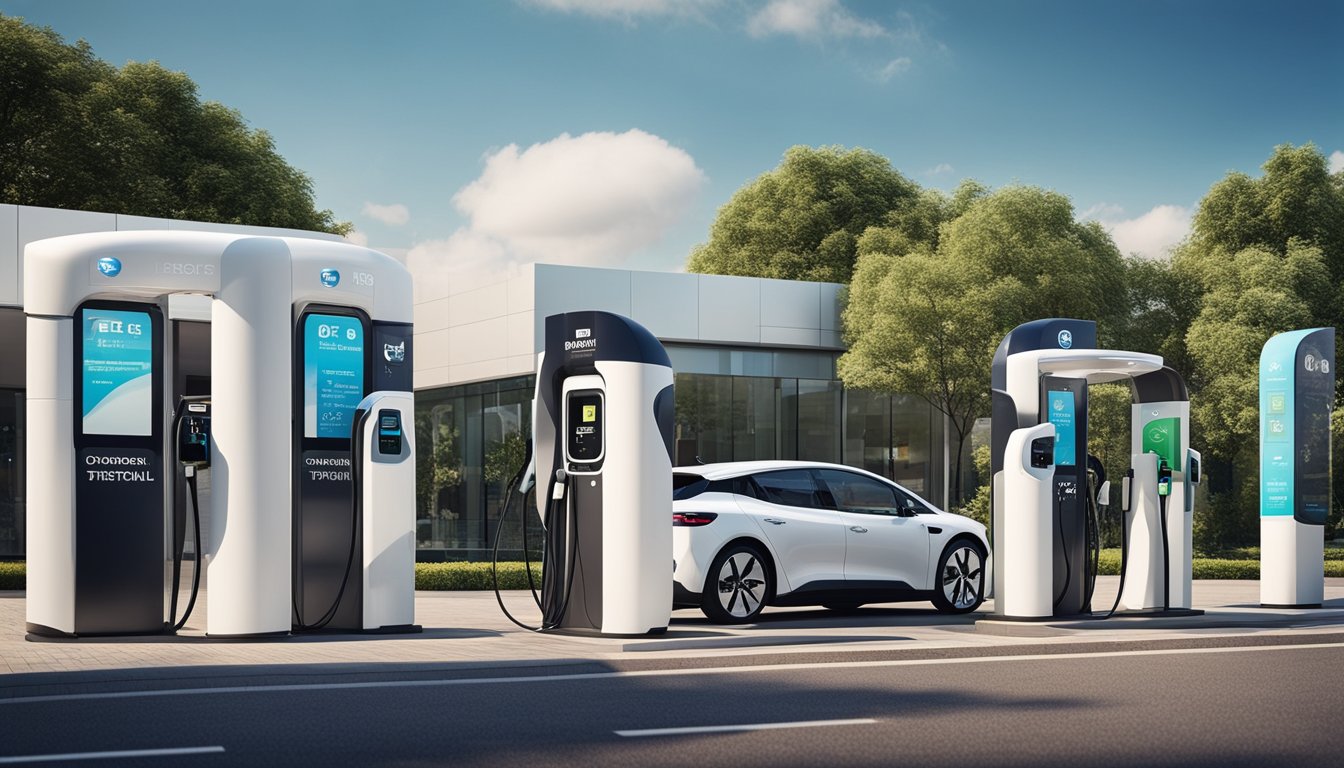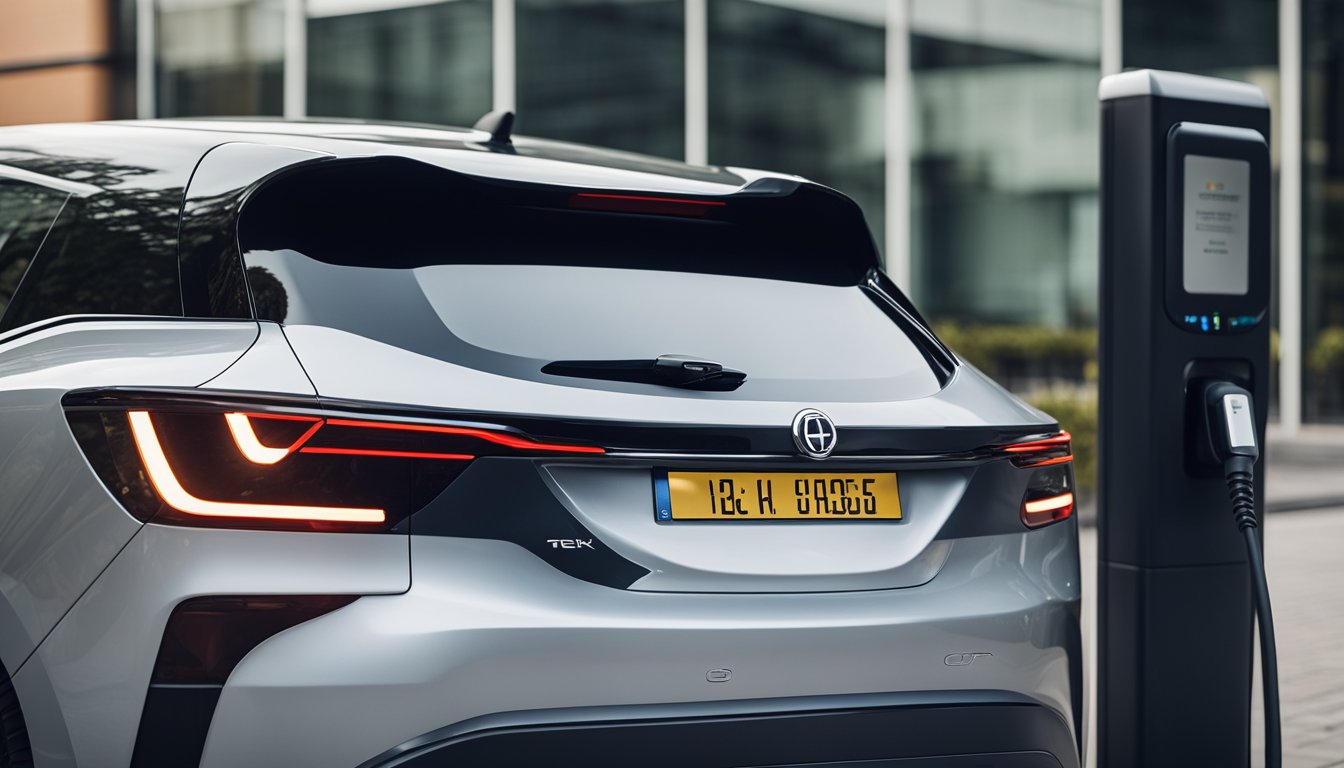Late updated: 06 Jan 2025 08:01
Written by: Amber Collins
Electric Vehicle Charging Solutions For UK Companies: Navigating Business Needs
For UK companies looking to embrace sustainability, electric vehicle (EV) charging solutions offer a pivotal opportunity to innovate and grow. In today's landscape, it's not just about providing charging stations; it's about integrating these technologies seamlessly into businesses. The integration of EV solutions significantly enhances operational efficacy and employee satisfaction while meeting environmental obligations.

Our expertise lies in navigating the complex landscape of electric vehicle charging. As we explore the various options available, we'll consider how different charging infrastructures can be tailored to specific business needs. Whether it's workplace charging or fleet solutions, the right setup can drive significant benefits.
By focusing on user-friendly technology and sustainable practices, companies can optimise the charging experience for end-users. This approach not only supports the company's green agenda but also ensures compliance with existing regulations. We will cover the essentials needed to make informed decisions about implementing EV technology in your business.
Key Takeaways
- Integration of EV charging benefits operations and sustainability.
- Tailored charging solutions enhance business efficiency.
- User-centric charging optimises the experience and compliance.
Developing EV Charging Infrastructure for UK Businesses
Creating an efficient electric vehicle charging network is a critical task for UK companies. By assessing the feasibility of sites, integrating renewable energy, and navigating local regulations, we can streamline the implementation process.
Assessing Site Feasibility for Charging Points
Understanding the feasibility of a site is the first step in setting up charging infrastructure. We need to consider the availability of existing electrical infrastructure, proximity to power sources, and physical space for chargers. A site survey is essential, involving technical assessments and the identification of potential challenges.
It’s important to consult with utility providers to ensure adequate power availability. Businesses must evaluate the compatibility of the site with different types of charging stations, whether they require fast or slow chargers, and plan for future scalability.
Accessibility is another key factor, including ensuring that chargers are located where they are most needed. For example, in employee car parks or customer-facing areas.
Integrating Renewable Energy Resources
Incorporating renewable energy can make charging infrastructure more sustainable and cost-effective. We could explore options like solar panels or wind turbines to generate clean energy on-site. By using energy storage systems, businesses can store surplus energy and use it to power electric vehicle chargers during peak demand.
Connecting EV chargers to a renewable energy grid could help reduce operational costs and carbon footprint. Smart technologies, such as charge point management systems, can optimise energy usage by adjusting the charging times according to solar or wind energy production.
Investing in renewable energy may have an upfront cost, but it aligns with sustainability goals and offers potential financial incentives or tax benefits.
Navigating Local Authorities and Legislation
Compliance with local regulations is necessary when developing EV charging infrastructure. We must engage with local authorities early in the planning process to understand requirements like planning permission and construction guidelines. Each region may have specific EV infrastructure policies, so a thorough review of documentation is required.
Understanding legislation around electric vehicle infrastructure ensures we are not faced with unforeseen challenges. This involves compliance with health and safety standards and addressing liability concerns. Engaging with local communities and stakeholders can also prevent resistance to new installations.
By adhering to legal frameworks, businesses can facilitate smoother project execution and minimise delays or penalties.
Optimising the Charging Experience for Users

For UK companies looking to improve electric vehicle (EV) charging, providing rapid charging solutions, implementing smart load management, and electrifying corporate fleets are key strategies. These efforts can significantly enhance the user experience by ensuring accessibility, efficiency, and integration into daily routines.
Providing Rapid Charging Solutions
Rapid charging solutions are critical for reducing downtime and ensuring vehicles are ready for use. Public charging solutions that include 50kW rapid chargers can cater to diverse EV charging demands. They offer charging speeds that significantly shorten wait times.
At workplaces, installing rapid chargers can be a boon for employees and the corporate fleet. Accessibility to fast charging at work supports the transition to electric, ensuring that vehicles are charged during the day and ready for any unexpected tasks or journeys.
Enhancing Usability with Smart Load Management
Smart load management focuses on optimising power distribution across multiple EV charging points. By efficiently managing load distribution, we can prevent grid overload while ensuring each vehicle receives adequate power for charging.
This system is particularly beneficial in environments with high charging demands, such as corporate offices or public charging stations. Our approach includes dynamic energy allocation based on demand, charging speed requirements, and available power, leading to improved customer experience and operational efficiency.
Electrifying Corporate Fleets
Electrifying corporate fleets is not just about replacing conventional vehicles with EVs; it involves thoughtful integration of EV charging solutions. By aligning charging infrastructure with fleet operations, we can ensure seamless transitions and enhanced productivity.
Fleet operators must consider locations for chargers to optimise routes and minimise downtime. Providing a mix of public charging solutions and dedicated charging points at company facilities supports fleet needs. This targeted approach fosters a smooth shift to electric vehicles, ensuring they become an integral part of daily business operations.
Frequently Asked Questions

In the evolving landscape of electric vehicle (EV) charging solutions for UK companies, understanding market providers, covering networks, and selecting compatible systems is essential. Choosing user-friendly apps and evaluating installation criteria are also crucial components of this transformation.
What are the leading providers of electric vehicle charging solutions for businesses in the UK?
Prominent companies such as Mer UK, Actemium, and ORKA offer tailored strategies for EV charging solutions. Their expertise helps businesses optimise infrastructure to meet the increasing demand.
Which EV charging networks offer the widest coverage across the UK?
Several networks, including those operated by Mer UK and other major providers, boast extensive coverage. This ensures widespread access for both company fleets and individual EV drivers across the country.
How can UK companies choose the best electric vehicle charging solution for their needs?
Businesses should assess factors such as cost, installation requirements, and scalability. Consulting with industry experts can also offer insights into the most effective strategies tailored to specific operational needs.
What are the most user-friendly EV charging apps available for UK drivers in 2024?
Apps like Zap-Map, PlugShare, and Shell Recharge are praised for their intuitive interfaces and practical features. These apps enhance the charging experience by providing real-time data on charger locations and availability.
What criteria should be considered when installing EV charging stations for company fleets?
Key criteria include location convenience, charger compatibility with various vehicle types, and future-proofing capabilities for anticipated fleet expansions. These factors significantly influence the efficiency and accessibility of charging operations.
Who are the emerging innovators in the UK's EV charging industry?
Innovative companies, such as those focusing on smart charging technologies and renewable energy integration, are making significant strides. Their advancements continue to push the industry towards more sustainable and efficient solutions.
